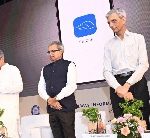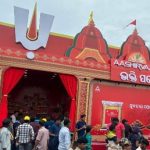Bhubaneswar: Eminent poet Jayanta Mahapatra said his childhood suffering being bullied and sexually assaulted fould solace in poetry.
“I didn’t have a happy childhood. My school life was a bitter one. I was bullied, sexually assaulted, giving me wounds and scars that never seemed to go away. But, then poetry came bringing with it a healing touch.”
The first Indian poet who won Central Sahitya Academy Award for English poetry, Mahapatra was in a one-to-one candid conversation with established translator and literary critic Jatin Nayak on the topic ‘The Poetic as Personal:My Life in Words’, at the Odisha Literary Festival, organised by the The New Indian Express, here on Saturday.
“Let me confess, I never wanted to be a poet. The thought of writing poetry had never come to mind when I was young. Poery happened to me at the ripe age 38, and slowly began, to rub off the pain that I suffered during my childhood”, said the celebrated litterateur.
Mahapatra who always connects his intimate personal experiences with his imaginations in his poetry said, ” I have spent my time looking at trees, catching butterflies and walking around my house searching ant holes. These little things have had a profound impression on me.”
Interestingly, the high brow English poet revealed that he was very poor in English in his student days. ” I failed in English literature twice, once in senior secondary examination and in Ravenshaw college. My English was not good.”
When asked “if not poet what would he have become?”, Mahapatra replied, “But, I am not a poet. I just write poems.” On his transition from a teacher in science to a poet, he said there was not much difference between the two fields. Both deals with abstract and ambiguous things.
The internationally acclaimed poet has never thought of coming out of his home town Cuttack despite his global recognisation. He said that the soil he tested when he was a toddler keeps him binding to the root.
A great admirer of Mahatma Gandhi, Mahapatra said,”Gandhiji meant to me more than my father. I still feel admiration for him. I can’t get it of it.”
The poet advised the young writers, “Just go on writing poetry. Don’t wait for Sunday to write a poem.” According to him poet should always remain committed to the community and society rather to himself.






